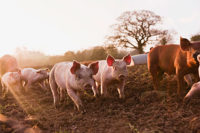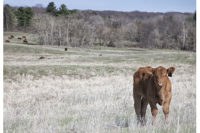Guest Commentary
A call to food producers: Listen to consumers on animal welfare

Observers of the growing consumer demand for ethically selected food products know that purchasing preferences for meat, eggs and dairy are now increasingly influenced by more than just price and quality. Today, consumers are more concerned than ever about animal welfare in food production.
In a new survey commissioned by American Humane Association, 95 percent of nearly 6,000 respondents said they were concerned about farm animal welfare, an increase of six percentage points from a similar survey conducted in 2013. In addition, 93 percent reported that buying products from humanely raised animals is very important to them. In the 2014 study, over three-quarters of respondents said they would be willing to pay more for humanely raised meat, eggs and dairy products, up from 74 percent just last year. In both the 2013 and 2014 surveys, products labeled “humanely raised” ranked higher in consumers’ expressed perceptions of importance than those labeled “antibiotic-free,” “organic” or “natural.”
Animal welfare certification is a proven way to demonstrate that farm animals used for meat, eggs and dairy products are raised and treated humanely. A humane certification label assures consumers that farmers and producers across the U.S. are raising these animals under higher standards covering everything from adequate space to air quality, diet, living conditions and the ability to express natural behaviors.
To meet the demand for humane food alternatives, American Humane Association created the first farm animal welfare certification program. The American Humane Certified™ label provides independent, third-party verification and validation that certified producers’ care and handling of farm animals meet their science-based animal welfare standards. The certification gives consumers the ability to choose humanely raised and processed beef, pork, poultry and dairy products at the supermarket.
The good news is that humane certification has now reached a milestone with more than 1 billion animals covered under American Humane Association’s welfare standards. The not-so-good news is that this represents only about 10 percent of the animals raised for food on American farms and ranches. This shows us there is much more work to be done to ensure Americans can access affordable and humanely raised meat, eggs and dairy products.
To raise awareness of the importance of humane farm practices, American Humane Association held a Capitol Hill briefing Nov. 13, 2014, “The Humane Table: Celebrating the Humane Heartland.” The briefing highlighted the significant advances in humane-centric animal agriculture that allow consumers to align food purchases with their values and celebrates those enlightened farmers, ranchers and producers who not only put food on America’s tables, but are raising their animals humanely. To bridge the gap between what consumers want and what is currently available in the marketplace, more producers need to take the steps that would allow them to affix a humane certification label to their products. This humane pledge is the best way to ensure a good quality of life for all animals raised on American farms and ranches.
American Humane Association is conducting the Humane Table briefing not to advocate new legislation, but to build awareness of how important farm animal welfare is to consumers as well as to the success of farmers and ranchers. Awareness built today is what’s needed to create the demand for more producers to adopt humane standards and earn the right to display a humane certification label on their products.
Looking for a reprint of this article?
From high-res PDFs to custom plaques, order your copy today!







